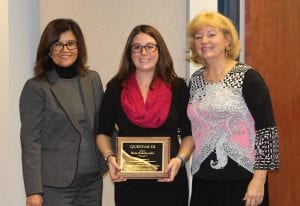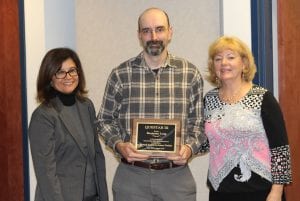New Lebanon Science teachers Kara Sokolowski and Ben Long spent this last summer working along researchers in labs. They were part of a unique professional development opportunity offered by Questar III BOCES Summer Science Research Program for Teachers. They were two of seven teachers (from the 23 component districts) who completed their second year as science fellows.

District Superintendent Dr. Gladys Cruz, Kara Sokolowski and Program Director Jane King at the ceremony honoring teachers and scientists for their participation in the 2016 Summer Research Program for STEM Teachers.
Sokolowski worked with Dr. Morgan Schaller from RPI on a big project related to the last warming period during the Paleocene-Eocene about 56 million years ago. It was believed that an outgassing event caused this warming period. However, Dr. Shaller found microtektites (gravel-size bodies composed of black, green, brown or gray natural glass) in sediment samples from Florida and New Jersey. Microtektites are formed from debris ejected during meteorite impacts. Dr. Shaller has reason to believe that the warming event during the Paleocene-Eocene was caused by an impact and not by outgassing, since he found these microtektites in sediment.
“This is very controversial as it goes against what was previously believed to be the cause of the warming,” said Sokolowski. “I have always been interested in climate research, so I really enjoyed working on such controversial and relevant research.”

District Superintendent Dr. Gladys Cruz, Ben Long and Program Director Jane King at the ceremony honoring teachers and scientists for their participation in the 2016 Summer Research Program for STEM Teachers.
Long worked with Dr. Ellen Braun-Howland from the Wadsworth Center studying environmental factors that trigger production of toxins in cyanobacteria. Although his research didn’t provide the expected results, Long learned a lot from the experience.
“When I walked into the lab, I was able to put myself into a situation where everything was new and the learning curve was steep. It helped me to remind myself of what my students go through when they walk into my classroom for the first time, said Long.
“I was able to gain a lot of confidence in doing some lab techniques that were not widely used when I was in school. So, although familiar with the techniques, I never had hands on opportunity to actually do them myself. These techniques include PCR and gel electrophoresis, both of which I hope to incorporate into my class this year,” said Long.
Long explained that PCR allows us to take small amounts of DNA and amplify them millions of times so the DNA is visible when stained. Then gel electrophoresis allows us to analyze the DNA the same way people usually see on CSI type shows.
Sokolowski added that the past two summers were a great experience and she gained a lot of professional development about current practices in the sciences as well as time to work on curriculum development.
“I have more ideas than time right now which I think is great because it has made me even more excited about teaching,” said Sokolowski.
“I created three inquiry-based lesson plans that I will be using this year. I am trying to tell the students less and let them discover more on their own,” said Sokolowski.
Both teachers would highly recommend this program to others and encourage interested teachers to contact Jane King from Questar III BOCES.
“I highly recommend this program to anyone who wants a new way of thinking about teaching. It has really opened my mind to the many possibilities beyond the ‘normal’ ways of teaching,” said Sokolowski.
“I am incredibly grateful to Ellen and the other members of her lab who welcomed me into their space. They were very generous with their time and knowledge,” said Long.
